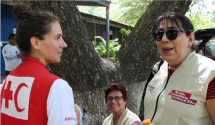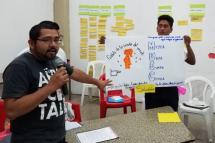The Importance of Prioritizing and Being Specific in Key Community Messages/La importancia de ser específicos y prioritarios en los mensajes clave comunitarios
This is a blog/report on a 2018 training of trainers (TOT) refresher workshops held by the Community Action on Zika (CAZ) project in four countries (Honduras, Dominican Republic, Colombia, El Salvador).
The trainings were led by the CAZ project, with support in curriculum development and facilitation by Breakthrough ACTION. The workshops were aimed at project community technicians with the goal of updating knowledge around the key Zika behaviors, exchanging experiences and lessons learned, strengthening capacities, and providing tools that contribute to improving daily work.
The workshops mainly focused on improving the delivery of key messages about Zika to achieve the adoption of healthy practices in the prevention of the virus and lasting behavior change in the communities where the CAZ project works. In addition, the training curriculum included step-by-step guidance to carry out household visits, activities with children in schools, and during support group meetings. The curriculum also included a “how-to” on the correct use of materials depending on the audience, interpersonal communication to reinforce public speaking and counseling skills, and the tools to deal with the different barriers and difficulties that exist when working with communities. In addition, the sessions were accompanied by a field visit on the third day, where technicians were able to put what they learned into practice during a household visit, school activity, or a pregnant women’s support group meeting.
The experience demonstrated a need to emphasize the promotion of the key Zika behaviors with communities
Source: Johns Hopkins Center for Communication Programs
Date of Publication: August 30, 2019
SIMILIAR RESOURCES
Tools
Examples
- Technical Specifications Content Guide for Behaviors with High Potential to Prevent Zika
- Technical Specifications Content Guide for Behaviors with High Potential to Prevent Zika
- The Importance of Social and Behavioral Change Response in the Zika Outbreak: Lessons Learned from Ebola
- Zika Prevention Behavior Matrix
- Combating Zika: Social and Behavior Change Fact Sheet
- Zika Communication Network
- Zika Virus Disease: Questions and Answers
- Zika and Pregnancy: Questions and Answers
- Community Mosquito Control
- Zika App


